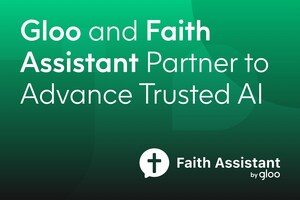New Gloo Survey Reveals What Ministry Leaders Think About AI & The Church
Initial results show that church leaders have a general understanding of AI, but are split in their views on how, or if, it should be used in ministry.
BOULDER, Colo., Aug. 2, 2023 /PRNewswire/ -- Gloo, the leading technology platform dedicated to connecting the faith ecosystem and releasing its collective might, announced initial results of its AI & the Church Survey. The survey was developed in conjunction with a working group of partners including Barna Group, Ed Stetzer, the Lausanne Movement, AI and Faith, and others. The goal of the survey is to help church leaders be more informed on peer sentiment, equipping leaders to drive the conversation around responsible use of artificial intelligence.
The 25-question survey used a snowball sampling method to cover a variety of topics from ministry role, church size, and congregational background to usage of AI, views on its usefulness, and sentiments on its moral and ethical implications. At the time these results were drawn, 1,573 people participated in the survey, 83% of which were church leaders, and 17% were church members. The survey is now reopened, and full results are available and will continue to be made available through Gloo.
Steve Millette, director of common measurement at Gloo, stated, "Not surprisingly, these early results reveal a lot of variability on views of AI in the faith ecosystem. While leaders generally understand AI, they are indicating they need more training in order to use it effectively. More discussion is needed about how the Church can properly use the technology to support ministry."
Key results from the survey include:
Understanding AI: Sixty-three percent of leaders are comfortable in their understanding of AI, saying they are fairly to somewhat knowledgeable, while 28% of church leaders say they are only slightly or not knowledgeable at all. Only 9% considered themselves very knowledgeable.
Using AI: While AI tools undergird a wide swath of online and digital tools and platforms, most church leaders do not use AI directly in ministry. Sixty-two percent state they rarely or never use AI in their work, 19% cite occasional use, with another 19% that use AI on a weekly or daily basis.
Lead Pastor at Kansas City's Westside Family Church Randy Frazee said, "As church leaders, we are usually behind the innovation curve. That reluctance costs us real kingdom advances. While I've got one eyebrow up watching the unfolding AI, I am excited that more people might draw a step closer to Jesus because of it. AI is here to stay, and we can use it as a tool to draw people toward the light."
Concerns about AI: Fifty-four percent of respondents state they are quite to extremely concerned about ethical or moral issues related to using AI in the church. Another 40% indicate they are slightly to somewhat concerned, and 6% are not concerned at all.
"It's a good thing that Christians are curious, yet cautious about AI — the people working in AI are, too. The question is, how will we respond? This data should compel us toward engagement and ethical use of AI," said Ed Stetzer, missiologist and dean of the Talbot School of Theology at Biola University.
Outlook on AI: A majority of leaders (54%) are somewhat to very uncomfortable with the emergence of AI in the world, while 32% are somewhat to very positive or excited. Fourteen percent remain neutral.
When it comes to using AI in a church context, respondents were divided.
Use within their church: Forty-three percent are somewhat to very uncomfortable with the idea of using AI in their church, with 27% being somewhat to very positive or excited, while 30% were neutral with no strong feelings either way.
Use by the Big C Church: Forty-one percent believe that the Church should moderately leverage AI in ministry, and 9% assert the Church should enthusiastically leverage the technology. Seventeen percent hold that the Church should resist the use of AI in ministry, with an additional 7% that declare the Church should condemn it. Twenty-six percent hold a neutral position on the use of AI in ministry.
"The data reveals that church leaders are quite split in their opinions on the role of AI in the Church and how they are reading the terrain," said Savannah Kimberlin, associate vice president at Barna Group. "Forty-three percent of respondents admitted to feeling uncomfortable or anxious about AI being used in churches, and one in four went so far as to say the Church should resist or condemn the use of AI. However, one in three enthusiastically shared they believe AI will improve their efficiency or effectiveness. Stats like these show that the time is right to come together and have meaningful conversations on the topic."
Going forward, Gloo and the working group of partners will continue to gather data, ask new questions, and track sentiment changes over time. A variety of organizations will contribute analysis, commentary and resources to be made available at no charge to ministries on the AI & the Church Hub.
To see the full results, visit gloo.us/ai-survey-results.
Gloo is the trusted platform that releases the collective might of the faith ecosystem. As the leading technology innovator, Gloo connects people, partners, world-class content, funding opportunities, and more to help ministry achieve their goals and change more lives. Gloo is based in Boulder, Colorado, employing a team of more than 150 people.
SOURCE Gloo
WANT YOUR COMPANY'S NEWS FEATURED ON PRNEWSWIRE.COM?
Newsrooms &
Influencers
Digital Media
Outlets
Journalists
Opted In





Share this article